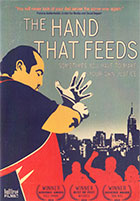
The Hand That Feeds 2014
Distributed by Bullfrog Films, PO Box 149, Oley, PA 19547; 800-543-FROG (3764)
Produced by Rachel Lears & Robin Blotnick
Directed by Rachel Lears & Robin Blotnick
DVD, color, theatrical version: 84 min., broadcast version: 56 min.
High School - General Adult
Labor Relations, Latin America, Business, Ethics
Date Entered: 02/18/2016
Reviewed by Rob Bohall, George Fox UniversityChronicling the efforts of exploited immigrant workers at a sub shop in New York City, this accessible and evenly-paced documentary provides a concise vignette of the power of collective action by exploited low-wage workers to achieve justice and improve working conditions.
At the center of the story is a soft-spoken, amiable sandwich-maker named Mahoma, a shy father of two and loving husband. Like the majority of other workers at the Hot & Crusty Sandwich Shop, for years he was paid less than minimum wage with no benefits for more than full time employment in an unsafe work environment. Complaints to management about unfair wages and a hazardous work environment were met with threats to contact immigration authorities.
Mahoma and his fellow workers get connected with a small grassroots labor group that provides legal counsel and moral support, encouraging him and his co-workers to organize. The contrast of the labor organizers -- mostly young, idealistic, and college-educated -- with the poor Spanish-speaking workers they advise is unmistakable to the viewer, and understood by the participants. Despite the obvious socioeconomic and cultural differences, the two parties’ ability to unite in their just cause and work through formidable legal and organizational challenges together is inspiring, and would provide good fodder for classroom discussion.
The documentary succeeds in making the viewer care about the Hot & Crusty workers and to emotionally join with them in their struggle. Students will likely respond to their cause and be willing to engage with the issues brought to light.
Mahoma is transformed by the success of the Hot & Crusty union and goes on to help organize workers at other businesses. The final shot shows Mahoma with a fist in the air and a smile on his face.
The film would have been stronger had it presented management’s perspective, but the owners declined to be interviewed. Despite the one-sided presentation, this work will likely resonate with students and stir both their hearts and minds.
Awards
- 2014, Audience Award for Best Feature, Full Frame Documentary Film Festival
- 2014, Audience Award, DOC NYC
- 2014, Best Documentary Feature, Sidewalk Film Festival
- 2014, International Jury Prize, Document Human Rights Film Festival
- 2015, Audience Award, aluCine Latin Film+Media Arts Festival
- 2015, Audience Award for Best Documentary, Chicago Latino Film Festival
- 2015, Best Documentary, Reading (PA) Film Festival